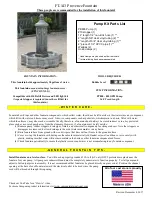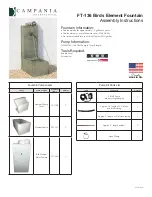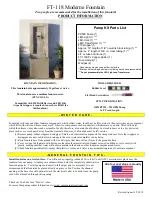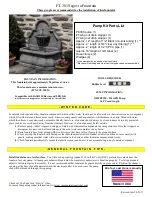
1-866-771-2663 | Page 3
• Combustible material should not be within 72 inches of the top of the unit, or within 48 inches
around the entire unit.
• Keep the appliance area clear and free from combustible material, gasoline and other flammable
vapors and liquids.
• If the flame goes out while burning, turn the gas valve off. Wait 5 minutes before repeating the initial
lighting procedure. Once you have a flame started, hold down the control knob for 1 minute.
• Do not add water into the unit.
• Do not operate unit if any part has been under water. Immediately call a qualified service
technician to inspect the appliance and replace any part of the control system and any gas
control that has been under water.
• Do not disconnect any part while unit is in use.
• Do not store a spare propane tank on or near this unit.
• If the heating unit is indoors, detach the propane tank and leave outdoors.
• Do not operate on a boat or vehicle. This unit must be used on a flat surface and outdoors ONLY.
• Always remove protective cover before operating (if applicable).
• Do not set the protective cover over the unit until it is turned off and completely cooled down.
• Check for leaks after not using the unit for long periods of time.
• Children should never operate this unit. Children must be supervised while near this unit.
• Keep gas tank at least 5 feet away from unit when lit. (if external tank)
• The maximum gas supply pressure is 250psi.
• All installation and repair should be done by a qualified professional. This unit should be
inspected annually and cleaned regularly.
• Inspect all elements of this heating unit before each use. If there is damage, the burner must be
replaced.
• Keep the hose out from any pathways to eliminate any accidental damage. (if external tank)
• Be aware of the hazards of high temperatures and stay away from the unit to avoid any burns or
injury.
• The gas supply tank should be constructed and marked with the specifications for the LP gas tanks
of the U.S. Department of Transportation or the National Standard of Canada CAN/CSA-B339, LP gas
tanks, spheres and tubes for Transportation of Dangerous Goods; and Commission.
• The LP gas tank must have a listed overfilling prevention device and a QCCI or Type I, (CGA810) LP
gas tank connection.
• This heating appliance should not be used on plastic or artificial wood desks.
• Children and adults should be alerted to the hazards of high surface temperatures and should
stay away to avoid burns or clothing ignition.
• Young children should be carefully supervised when they are in the area of the appliance.
• Clothing or other flammable materials should not be hung from the appliance or placed on or
near the appliance.
• Any guard or other protective device removed for servicing the appliance shall be replaced
prior to operating the appliance.
• Installation and repair should be done by a qualified service person. The appliance should be
inspected before use and at least annually by a qualified service person. More frequent cleaning
may be required as necessary. It is imperative that the control compartment, burners and
circulating airways of the appliance are kept clean.
IF APPLICABLE:
• Allow heating item to cool completely before placing on lid.
• DO NOT use heating item while lid is installed. Always remove the lid while heating item is in use.




































